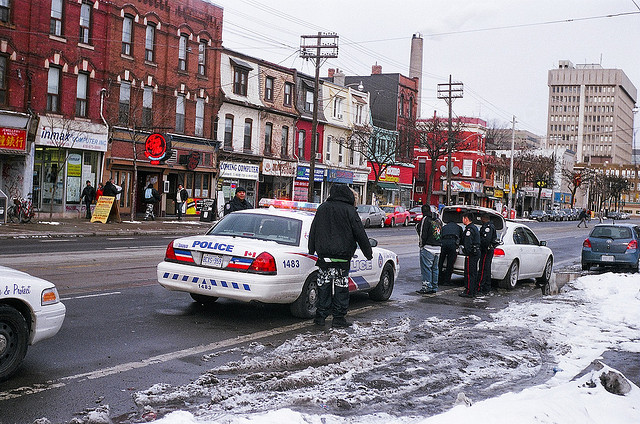Like this article? rabble is reader-supported journalism. Chip in to keep stories like these coming.
Concerns continue to grow over carding practices in Toronto, specifically over how much data is being collected, and what this means for privacy, and how it is being used to disproportionately gather information on people of colour in Toronto.
On Tuesday September 1 a community consultation about carding practices will be held in Toronto as part of a provincial initiative to review policing practices.
The high percentages and a clear relation between carding practices and the harassment of racialized people, specifically the Black community, was detailed extensively in an 2010 investigative report by the Toronto Star headed by Jim Rankin. Human Rights Commissions releases also show the disproportionate amount of data collected by the police on people of colour in Toronto.
Black Lives Matter-TO has continually brought racial profiling to the forefront of the carding debate arguing that carding creates further databases of information on people of colour in Toronto. A Black Lives Matter demonstration in July protesting police violence resulted in Toronto Mayor John Tory requesting a meeting with the group.
Versadex, the police records management software used by the Toronto Police Service (TPS), is a data retention system and database. TPS officials can document someone’s race, the people they are associated with, and where they have been in the past.
Information collected by Toronto police goes into the Versadex database and is added to the CPIC system, which any security force in Canada can access, as well as the FBI and the United States Homeland Security.
Susan Langlois, the Chief Operating Officer for Versaterm Inc., describes Versadex as “more granular, we have more details, we collect more.”
Versadex police records management software is used by more than 120 police forces around the world. The TPS initially spent $24.5 million on the Versadex system, and continues to add services to include further mobile technologies.
According to Langlois, the TPS “have implemented a lot of our services, our software is massive and all encompassing. They are building the foundation. Once they have core services, then they can add more.”
In a discussion with Langlois, she explained that many times, rates of “arrests jump up, rather than jump down” with using their system.
“Toronto police document people on forms called Field Information Reports, which include personal details including skin colour, the reason for the interaction, location and names of others — or ‘associates’ — who were involved in the stop,” writes Rankin.
Constable Hopkinson and Langlois describe Versadex as adding more to the initial system of Field Information Reports as Versadex is more efficient and allows the gathering of even more detailed information with the integration of various technologies such as license plate scanners and police cameras.
“When I [as an officer] am searching through the system, there is more granular information, the structure allows me to manipulate the information and make it much more flexible,” explains Langlois.
The manipulation of data means that an officer can map all of the information gathered through carding and street checks to locate where people have been in relation to a crime.
David Christopher of OpenMedia.ca explains the manipulation of data means acquiring personal information about people without their consent, and inevitably means that “the government can pull up detailed profiles of citizens without getting a warrant.”
Versaterm Inc. CEO, Warren Loomis, explains that a detailed system filled with highly specific and defining information of people means that for police “[a]s they’re driving down the street, the system will tell them, ‘Hey, there’s someone on this block with an outstanding warrant’…it gives officers more actionable information and more intelligence.”
Talisha Ramsaroop, a youth worker in Toronto’s Jane-Finch neighbourhood dis agrees and explains that gathering such detailed information “puts people in the system and we know that once a youth is in the system, their chances of success decrease. Carding invades people’s privacy especially in a racialized, over-policed community like Jane-Finch.”
Rodney Diverlus of Black Lives Matter-TO agrees and says that “some of these statistics are used to further criminalize people. If you’ve been stopped and carded, that is used against you in criminal cases to show that you’ve had interactions with police.”
Toronto Police Chief Mark Saunders, who has defended carding, claims that “we are not going to be random at what we record…I don’t want random recording of anything, it is not useful information.”
However, as Christopher and critics of carding have suggested, it is not random gathering that is necessarily the issue. Rather, it is the intentional gathering of particular peoples’ information and sharing it with various agencies that is the problem.
The community consultation will be held this Tuesday September 1 at the Toronto Reference Library Appel Salon, 789 Yonge St, 6:00 p.m.-8:00 p.m. Here is an online form and a request section for folks to share their views and request an invitation to the meeting.
Thomas is a a researcher and writer on security, Canadian policy, and corporate accountability. He is also the Director of Social Investigation for Tomorrow (SIFT) ww.siftresearch.com. Connect at @tsaczkowski
Photo: flickr/ Ryan



